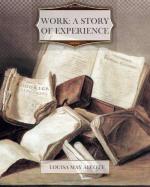Some read, some talked, some had flowers in their hands, and all sat at ease, rich and poor, black and white, young and old, waiting for the coming of the man who had power to attract and hold so many of his kind. Christie was so intent on watching those about her that she did not see him enter, and only knew it by the silence which began just in front of her, and seemed to flow backward like a wave, leaving a sea of expectant faces turning to one point. That point was a gray head, just visible above the little desk which stood in the middle of a great platform. A vase of lovely flowers was on the little shelf at one side, a great Bible reposed on the other, and a manuscript lay on the red slope between.
In a moment Christie forgot every thing else, and waited with a curious anxiety to see what manner of man this was. Presently he got up with an open book in his hand, saying, in a strong, cheerful voice: “Let us sing,” and having read a hymn as if he had composed it, he sat down again.
Then everybody did sing; not harmoniously, but heartily, led by an organ, which the voices followed at their own sweet will. At first, Christie wanted to smile, for some shouted and some hummed, some sat silent, and others sung sweetly; but before the hymn ended she liked it, and thought that the natural praise of each individual soul was perhaps more grateful to the ear of God than masses by great masters, or psalms warbled tunefully by hired opera singers.
Then Mr. Power rose again, and laying his hands together, with a peculiarly soft and reverent gesture, lifted up his face and prayed. Christie had never heard a prayer like that before; so devout, so comprehensive, and so brief. A quiet talk with God, asking nothing but more love and duty toward Him and our fellow-men; thanking Him for many mercies, and confiding all things trustfully to the “dear father and mother of souls.”
The sermon which followed was as peculiar as the prayer, and as effective. “One of Power’s judgment-day sermons,” as she heard one man say to another, when it was over. Christie certainly felt at first as if kingdoms and thrones were going down, and each man being sent to his own place. A powerful and popular wrong was arrested, tried, and sentenced then and there, with a courage and fidelity that made plain words eloquent, and stern justice beautiful. He did not take David of old for his text, but the strong, sinful, splendid Davids of our day, who had not fulfilled the promise of their youth, and whose seeming success was a delusion and a snare to themselves and others, sure to be followed by sorrowful abandonment, defeat, and shame. The ashes of the ancient hypocrites and Pharisees was left in peace, but those now living were heartily denounced; modern money-changers scourged out of the temple, and the everlasting truth set up therein.




